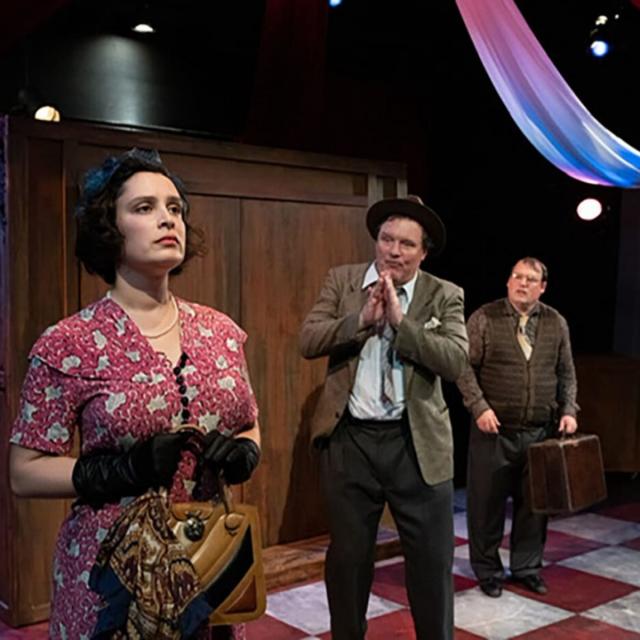
It takes courage to mount a Holocaust play at this point in time, if only because so many people are convinced the subject and their sensibilities have been put to the test once too often. The Odyssey Theater has bravely bucked the tide with Way to Heaven by Spanish playwright Juan Mayorga (translated by David Johnston).
Now in its West Coast premiere, the play deals with the infamous Nazi "special purpose" camp of Theresienstadt (Terezin). Located about forty miles from Prague, the camp was set up as a public-relations exercise by the Nazis, who wanted the world to believe it was a privileged internment center where prisoners were treated humanely. This was a despicable lie, of course; the inmates were treated brutally and the camp was nothing but an antechamber to Auschwitz. In the spring of 1944 the Danish Red Cross, disturbed by the serious charges filed on behalf of Danish prisoners, asked permission to inspect the camp. The Nazis decided to turn the inspection into a propaganda coup. They ordered the prisoners to pave streets, repair housing, build a wading pool for children, and plant flowers. It was a deception on the order of the dummy villages created by Prince Potemkin for Catherine II of Russia. The ruse succeeded in the short term; only a mildly adverse report was filed. Way to Heaven does not attempt to tell the whole, complex story of Theresienstadt. It focuses on three main characters: an unnamed Red Cross representative (Michael McGee), whose opening narration rationalizes his failure to see through the Nazi charade ("I wrote what I saw, I never said the camp was a paradise"); the camp commandant (Norbert Weisser), and Gershon Gottfried (Bruce Katzman), a Jew given the unenviable task of persuading his fellow-inmates to carry out the commandant's orders. The play's other characters -- two young women, a young man, several children -- are given very little to do; they serve mostly as background figures in an impressionistic canvas. The main conflict is between the commandant and Gottfried; their numerous face-to-face scenes provide the play with its drama and impact. Not that they are equal antagonists: the commandant has all the real power here; Gottfried is only a pawn, with his own rationale for his morally compromised actions: he is buying time and better treatment for the prisoners. So pleased were the Nazis with their Potemkin Village that they ordered a film to be made of it. Kurt Gerron, an inmate who had been a well-known actor and director, was put in charge of the filming of, "The Fuhrer Gives a City for the Jews." Gerron (who is not a character in Way to Heaven) and the other Jews who took part in the film undermined its credibility by deliberately exaggerating the benevolence the camp was supposedly enjoying. Even the Nazis realized the film was a travesty and never released it (though excerpts are shown after the play's end). Although Way to Heaven chooses to tell only a small, tightly contained part of the Theresienstadt story, it still manages to capture its essential horror and tragedy. The actors, director Ron Sossi and his creative team (who created an atmospheric and effective setting) deserve a lot of praise for their bold, good work.
